- William Shakespeare hit global headlines on December 8 after becoming first man in the world to be jabbed
- Mr Shakespeare died at University Hospital Coventry and Warwickshire from illness unrelated to the virus
- His family had been thrilled at the fame he enjoyed after getting the American-made Pfizer Covid vaccine
By DAN SALES FOR MAILONLINE and CONNOR BOYD ASSISTANT HEALTH EDITOR FOR MAILONLINE
William Shakespeare, the first man in the world to have an approved Covid jab, has died in hospital aged 81 after suffering a stroke.
Bill, as he was known, made global headlines on so-called V-Day on December 8 when he received the Pfizer/BioNTech jab at the University Hospital Coventry.
The former Rolls Royce employee and parish councillor passed away from a stroke last Thursday, University Hospitals Coventry and Warwickshire NHS Trust said, after a period of illness at the same hospital where he famously received his vaccine. He leaves behind his wife Joy, their two adult sons and four grandchildren.
At the time of his jab, much was made of the fact that he was called William Shakespeare and was from Warwickshire, but the pensioner was a fiercely proud Coventrian, according to his friends.
Paying tribute to her husband, Joy, 53, said: ‘Bill was so grateful for being offered the opportunity to become one of the first people in the world to be given the vaccine. It was something he was hugely proud of – he loved seeing the media coverage and the positive difference he was able to make to the lives of so many.
‘He often talked to people about it and would always encourage everyone to get their vaccine whenever he could.’
She added: ‘Bill had the most wonderful care at the hospital. Absolutely wonderful. All of the staff were so caring, compassionate and respectful and we couldn’t be more grateful. They are an absolute credit to their profession and the NHS.’
Bill, born in Coventry, served as a Parish Councillor for over 30 years at Allesley Parish Council and as a Governor at Coundon Court Secondary School for more than two decades. He was also involved in planting hundreds of trees in Coundon Wedge, Allesley and the creation of Coundon Wood.
He helped with the local fundraising to purchase Elkin Wood, now managed by The Woodland Trust.
‘Bill loved meeting people and helping them in any way possible,’ said Joy. ‘Most of all he was a wonderful husband, father and grandfather, nicknamed Pop Pops by the grandchildren. He left a huge imprint on everyone who knew him and will be greatly missed.’
He was a long-term patient at the Coventry hospital’s frailty ward. He was an in-patient on the ward when he received his vaccine in December, which he described as ‘wonderful’.
A picture of Mr Shakespeare receiving the shot while wearing a pair of Christmas slippers and his hospital gown made front pages around the world.
Mr Shakespeare was the second person to get an approved vaccine after Margaret Keenan, 91, got hers at the same hospital moments earlier. 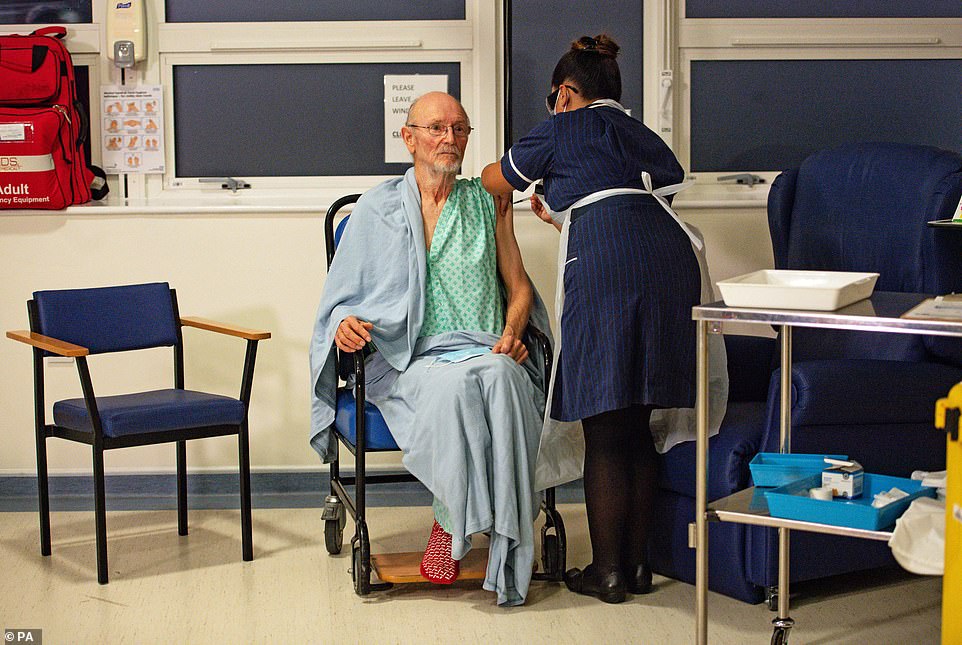
William Shakespeare, the first man in the world to have an approved Covid jab, has died in hospital after a long illness 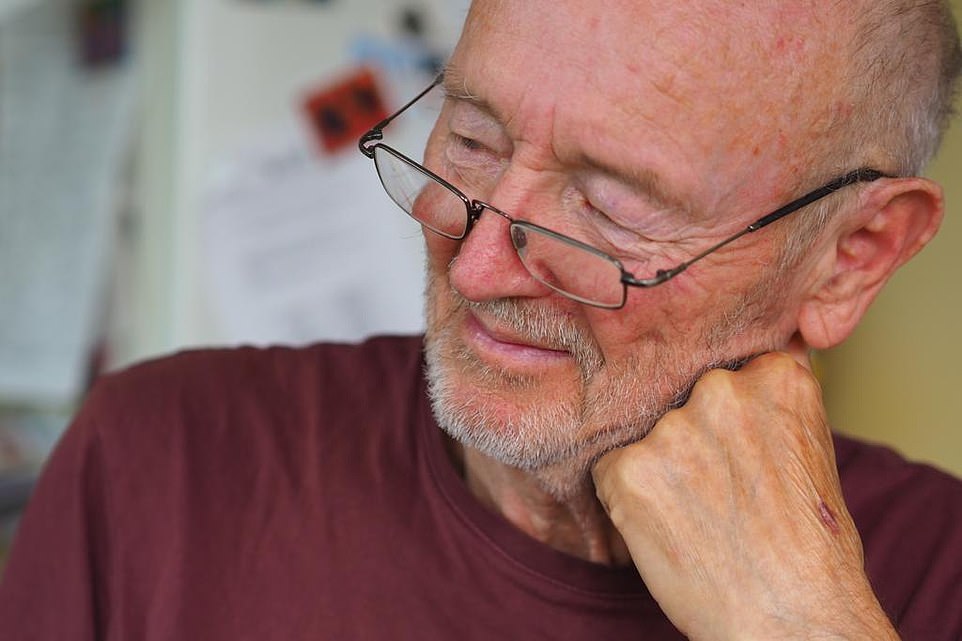
Bill’s family released this image of him and paid tribute to the former Rolls Royce employee and parish councillor who passed away from a stroke last Thursday.
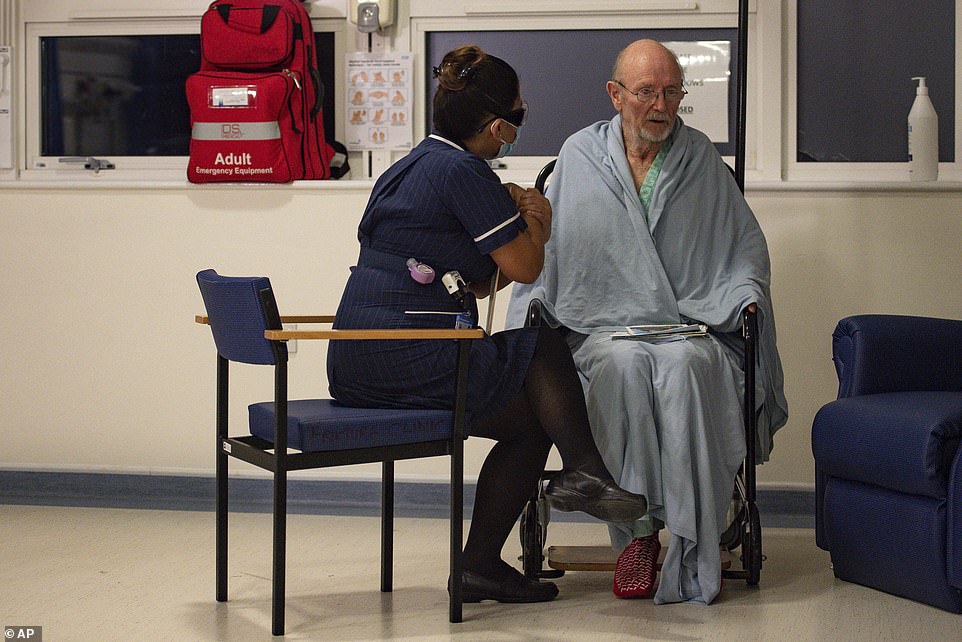
Mr Shakespeare was pictured receiving the shot in his left arm and wearing a pair of Christmas slippers with his hospital gown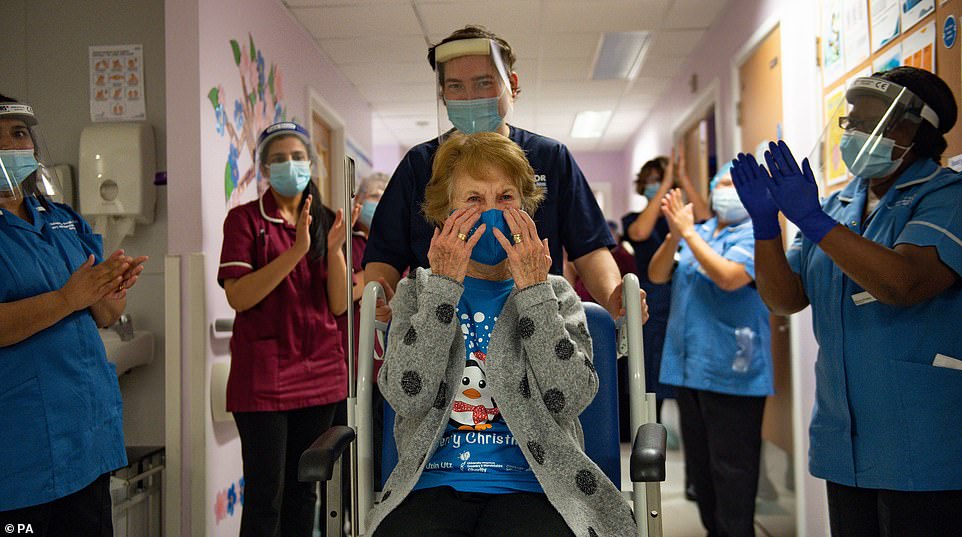
Mr Shakespeare was the second person to get an approved vaccine after Margaret Keenan, 91, got hers at the same hospital moments earlier
Both received the Pfizer vaccine, after the US firm became the first jab candidate to seal approval for mass use by regulators in the UK in December.
Thousands of men and women were given the vaccine during trials that began in early 2020 to study its safety and efficacy before being rolled out to the public.
Coventry councillor Jayne Innes, who was a friend of Mr Shakespeare, said in Facebook post that the ‘best tribute to Bill is to have the jab’. She added that he would be remembered for many things, ‘including a taste for mischief’.
The poignant image of him dressed in festive slippers with his hospital gown became a symbol of home amid the dark days of lockdown.
William Shakespeare’s family are ‘86% sure’ he is related to the Bard
The William Shakespeare who received a coronavirus vaccine today is believed to be related to the Bard, his family claimed today.
His niece Emily Shakespeare, a PhD candidate at Waterford Institute of Technology in Ireland, said relatives think the connection is very likely.
She tweeted today: ‘Around 86 per cent sure we are. Bill’s ancestors closely follow Coventry’s past with the industry there. And I have glimpsed a connection with the ‘Kerseley branch’ of the Bard’s descendants.’
Ms Shakespeare added that her uncle was ‘English through and through’, and there was no link to Ireland.
He is from near Stratford-upon-Avon in Warwickshire, which was also the Bard’s home town.
The Shakespeare Birthplace Trust confirmed to MailOnline there are no direct descendants of William Shakespeare today, although there are descendants of his sister Joan who married a William Hart.
William Shakespeare married Anne Hathaway and they had three children, Susanna, Judith and Hamnet. However all four of the couple’s grandchildren died without heirs, so there are no direct descendants today.
Susanna and John Hall’s only daughter, Elizabeth, married twice but both marriages remained childless. Judith and her husband Thomas Quiney’s three sons all died at an early age. Hamnet died aged 11.
The Trust added that it had no immediate knowledge of any ‘Kerseley branch’, but will carry out further research to establish any information about this.
Mr Shakespeare had been believed to be related to the Bard, his family claimed in the days after the jab.
His niece Emily Shakespeare, a PhD candidate at Waterford Institute of Technology in Ireland, said relatives thought the connection was very likely.
She tweeted at the time: ‘Around 86 per cent sure we are. Bill’s ancestors closely follow Coventry’s past with the industry there. And I have glimpsed a connection with the ‘Kerseley branch’ of the Bard’s descendants.’
Ms Shakespeare added that her uncle was ‘English through and through’, and there was no link to Ireland.
His sad death was being mourned not only by his family but the many people he came into contact with today as news of his passing was revealed.
He was a ‘much-loved figure’ in the Coventry Labour party according to Jayne Innes, Whoberley ward councillor, and one who will be fondly remembered.
The Allesley resident had been a parish councillor for 30 years, of which he was chairman of the parish council for 20 years.
‘He was such a lovely man, one who had a real commitment to making his local area better,’ said Jayne.
‘During lockdown local families will have enjoyed walking amongst the trees planted by Bill and his colleagues in Allesley back in the 1980s.
‘He was also very involved with the creation of the Coundon Wood in 2005 and in fundraising for the purchase of Elkin Wood, now managed by the Woodland Trust in 1997.
‘Bill was a life-long campaigner, so he was delighted to be able to help encourage everyone to have the vaccine in order to return to all the things we enjoy in life. I’ve had my first. Having our jabs is the best tribute we can all pay Bill.
‘He was a keen photographer, loved jazz and socialising, and also loved the natural world and gardens. Bill will be remembered for many things including a taste for mischief.
‘He was a much respected figure in the Coventry Labour Party and he will be sorely missed.’
Angela Hopkins, Coventry Labour Party secretary, added: ‘Bill has been an active member for many, many years, particularly in Bablake ward where he has walked hundreds of thousands of steps every year campaigning for the party and was an Allesley Parish Councillor.
‘I know that he will be greatly missed not only by members in Bablake, but by colleagues across the constituency and beyond.’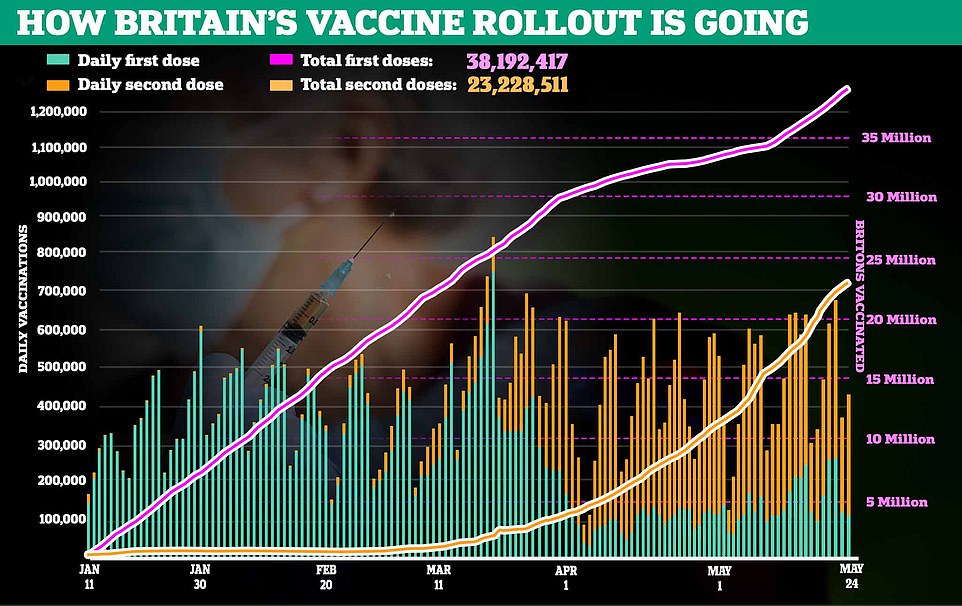
In the six months since Mr Shakespeare was given his vaccine, about 38.2million Britons have been given at least one dose of either Pfizer, AstraZeneca or more recently Moderna’s vaccines. More than 23.2million people in the country are now fully vaccinated.
He used to work at Rolls Royce and was also a school governor at Allesley Primary School, as well as at Coundon Court School.
He leaves behind his wife Joy, two sons, one also called William but known as Will, as well as Julian. He was also a proud grandfather. Funeral details have yet to be arranged.
So-called V-Day saw Britain national vaccination drive launch at 70 UK hospitals on December 8, with most doses given to the over-80s and extremely unwell people.
Day one saw around 5,000 people vaccinated, including the elderly, care home staff and NHS workers.
Mr Shakespeare and Mrs Keenan were two of about 100 people vaccinated on the first day of the rollout at Coventry.
Health Secretary Matt Hancock sobbed on live television watching footage of the pair having their jabs.
Britain was the first country in the West to start jabbing people with Covid vaccines after approving the Pfizer vaccine even before the US, where it was developed.
In the six months that have followed, about 38.2million Britons have been given at least one dose of either Pfizer, AstraZeneca or more recently Moderna’s vaccines. More than 23.2million people in the country are now fully vaccinated.
The FIRST to roll up their sleeves on V-Day: From 99-year-old WWII hero to nurse, 28, whose wedding was postponed by the pandemic… the brave Britons who beat the rest of the world to getting Pfizer Covid jab
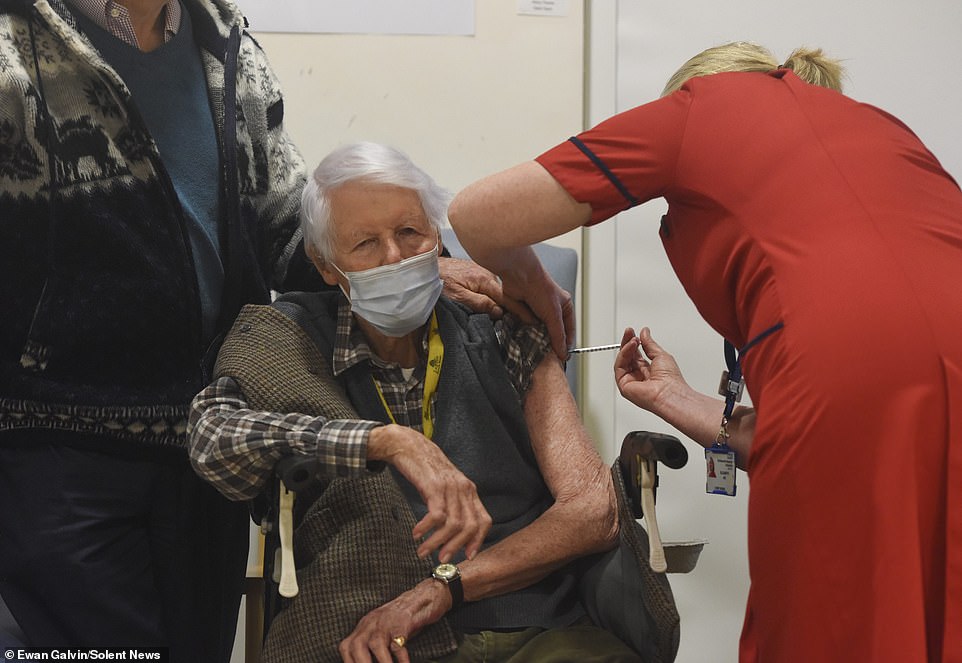
Michael Tibbs, 99, being administered the COVID vaccine by Liz Rix, Chief Nurse.Michael Tibbs was the first person in the South West to receive the Covid-19 vaccination at Queen Alexandra Hospital in Portsmouth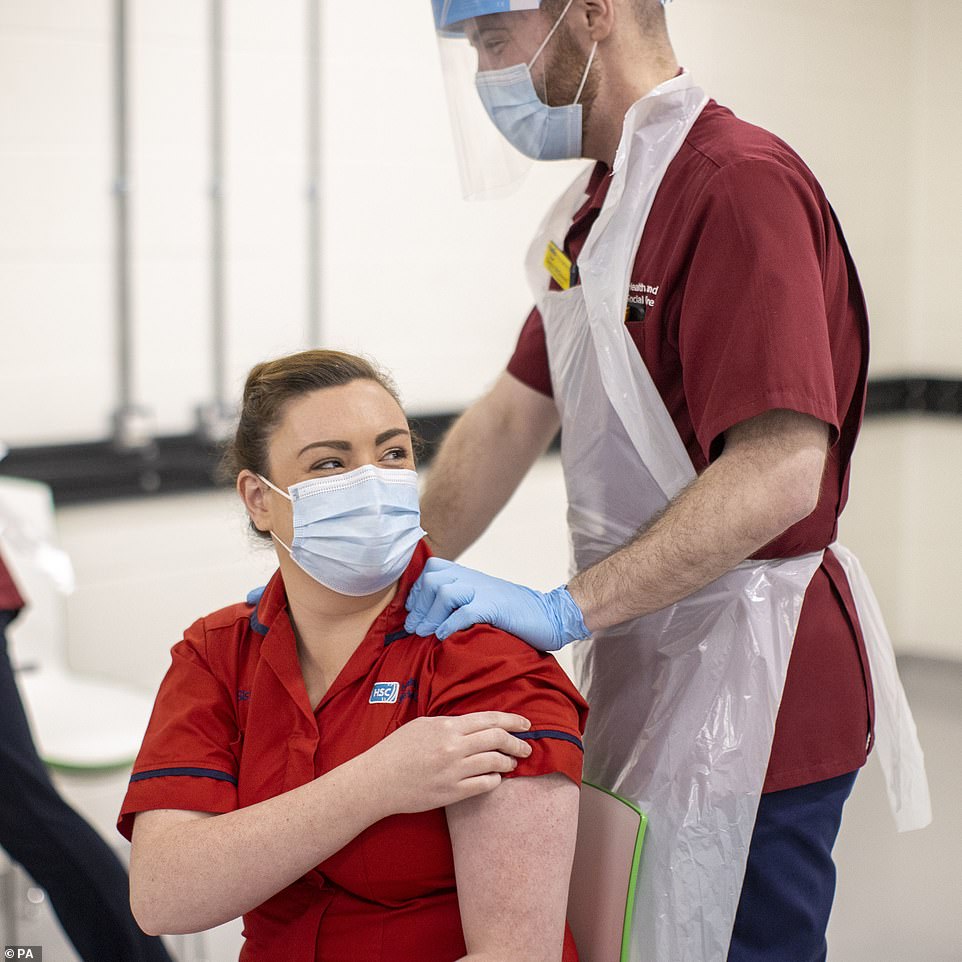
Sister Joanna Sloan was congratulated by her colleague Conor McDowell, as she became the first person in Northern Ireland to receive the first jab
The Royal Navy hero who fought on D-Day and was the oldest person to get a jab on V-Day
A Royal Navy veteran who was on the front line in WWII has joined the ‘V-Day’ battle against Covid-19 by becoming one of the first people in the world to receive the vaccine against the virus.
Royal Navy veteran Michael Tibbs, 99, smiled and joked with nurses as he walked into the Queen Alexandra Hospital, Portsmouth as the NHS mass vaccination programme across 70 hospitals in Britain swung into action.
Dressed in a tweed suit and cardigan, he made his way into the hospital’s vaccination centre using a walking frame and accompanied by his son Philip, a retired GP.
Mr Tibbs, believed to be the oldest person vaccinated today, said: ‘I didn’t know what to expect but it’s absolutely wonderful and feel really fortunate to have the vaccination.
‘During lockdown I have been confined to the garden, however when things get back to normal, I’m really looking forward to seeing my grandchildren and great grandchildren. The vaccine will make a difference to everybody and we are so fortunate to have the NHS.’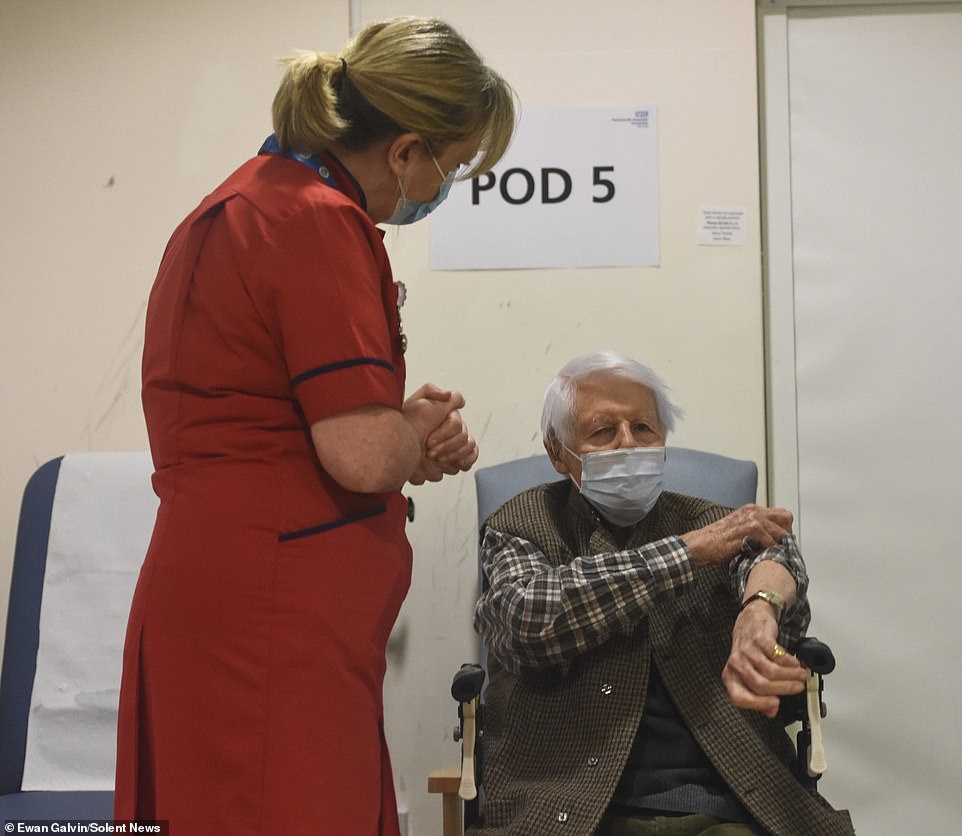
Michael Tibbs, 99, rolling up his sleeve in preparation in receiving the COVID vaccine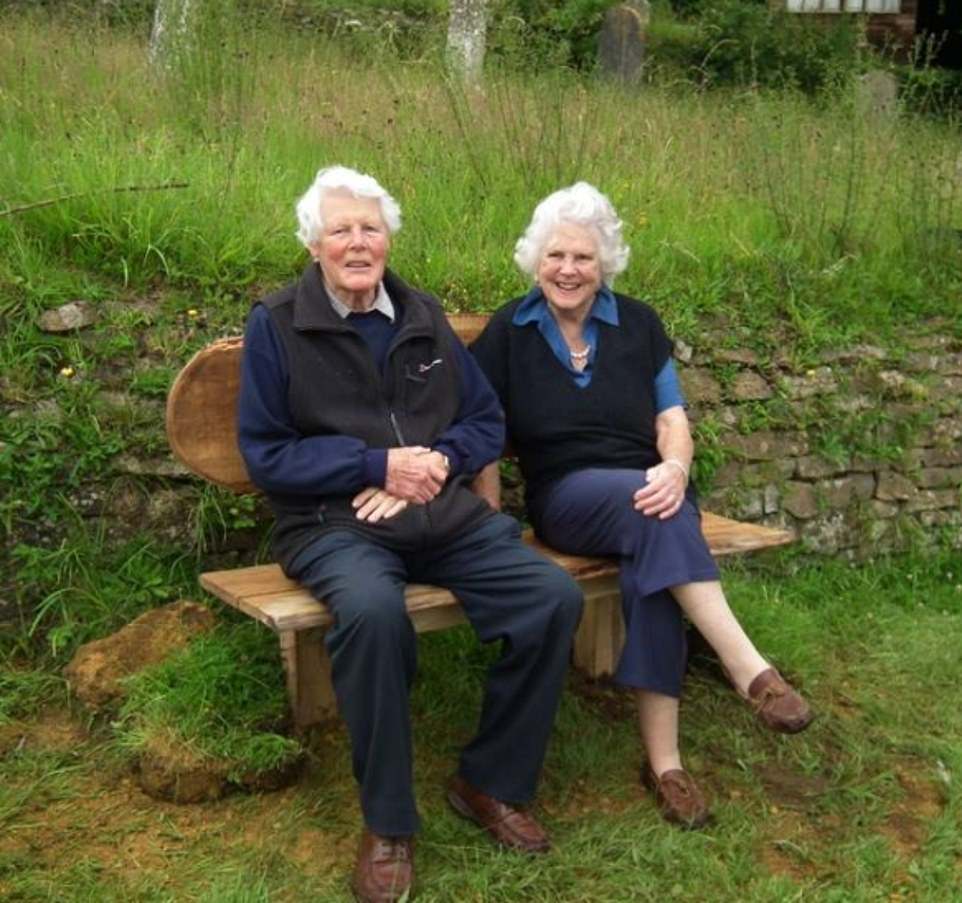
Mr Tibbs pictured with his wife Anne, who died last year
Mr Tibbs told MailOnline at the time: ‘I felt very privileged to be among the first to receive the vaccination. It was a doddle, completely painless, just like the flu jab.
‘There was a hell of a lot of hullaballoo at the hospital, with TV cameras, the chief executive and chairman all watching the fun. I don’t know how you’re supposed to feel when you’re 99 years old, but I feel fine.
‘In some respects, the way the nation has united in the fight against this virus is rather like the War, but the big difference this time is that the enemy is unseen, and you can’t just go out there and attack it as we did in the Navy.
‘I’m so pleased that I’ll be able to go out again and see my grandchildren and my two great-grandchildren. Sadly, the second injection won’t be until early January, so my Christmas will be the same as everyone’s – rather limited, but we’ll make the most of it. ‘
His son Chris, who works for NHS England told BBC Radio5 Live’s Emma Barnett: ‘I feel a sense of relief today. It’s been a constant worry that one of the family, several of whom work for the NHS, might bring the virus into the house, and he’s very vulnerable because of his age and we all know people who’ve died.
‘It is sad that people like my dad, and my family, who’ve spent the last nine months doing what we’ve been told, to protect ourselves and other people, while other people are prepared to go to warehouse parties, and we’ve seen what happens when it spreads in the younger population and then passes into the older generation.
‘That’s when we see people coming into hospital and people die because of the careless behaviour of some younger people. I know that sounds a bit fuddy-duddy, but I do think it’s very important that people understand the consequences of their own personal choice to seek a bit of freedom.’
A little bemused by the media attention, Mr Tibbs blinked in the flashlights, but smiled when he saw a nurse, and shook her hand as he entered the building.
Mr Tibbs, the son of a Royal Navy chaplain, served aboard submarine HMS Tantalus in the Far East, and recalled surfacing in Port Said, Egypt when news came to the crew that the Germans had surrendered on VE Day, but ‘V-Day’ as today was dubbed, was also a proud a moment for the veteran.
The vessel completed the longest patrol of any British submarine in WW2 of 55 days’ duration.
Mr Tibbs was among the first of millions of Britons who will receive the Pfizer vaccine as Britain was the first country in the world to give approval for the drug’s use.
After the war, Mr Tibbs went to Oxford then joined the Sudan Political Service which administered the Sudan as a joint protectorate with Egypt.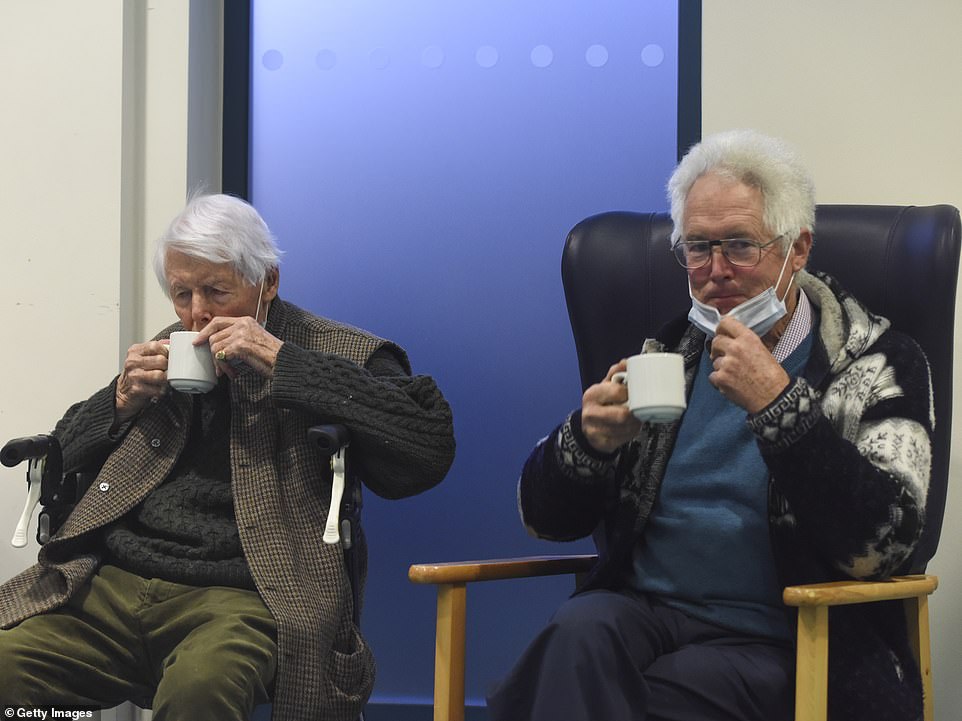
Michael Tibbs, 99, and his son Philip enjoyed a nice cup of tea together afterwards
At independence in 1954 he was a district commissioner. He gave a Sudanese TV crew a 4 hour interview to mark the 65th anniversary of independence. He is one of only two members of the service still alive.
In 1955, they returned to England, settling in Lynchmere, West Sussex. He worked for the AA for 10 years and was secretary of the Royal College of Physicians until he retired in 1986.
Since retirement he was Chairman of the Lynchmere Parish Council and continued to produce and direct the local pantomime
His wife Anne died last year after 67 years of marriage. He still lives in Lynchmere with his younger son Christopher and daughter in law (Sylvia).
During COVID he has found his confinement at home frustrating particularly as he would have liked to see more of his two great-grandchildren and spend time with his large circle of friends. Most frustratingly there is no pantomime this year, only the second time since 1947 that the village has not put on this traditional Christmas event.
Mr Tibbs told a Royal British Legion podcast about some of his remarkable wartime memories for the VE Day commemorations.
‘On our way home we learned in Port Said, there was a buzz going on about peace in Europe. ‘So sure enough, we discovered that was the day after we left there.’
‘On the way home, he and the crew held a service on board HMS Tantalus.
‘We dived to 60 feet, quite alone, and had our service down there. The captain made a little speech, and had our service.
‘He said that we were very grateful to be going home. And that our families would be very grateful that they were no longer threatened by these V1 and V2 bombs, and that we would remember our friends out in the Far East, still fighting.
‘By the time VJ Day came along. I was actually 1st Lieutenant of a small submarine up in the western isles of Scotland.’
If you like our work please consider to donate:
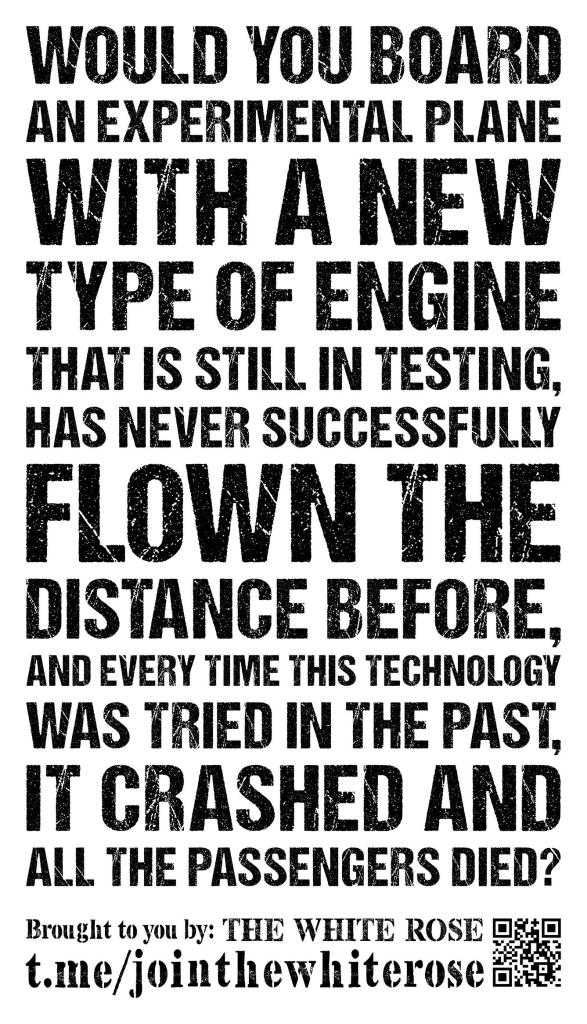
Related posts:
Views: 0
 RSS Feed
RSS Feed

















 May 30th, 2021
May 30th, 2021  Awake Goy
Awake Goy  Posted in
Posted in  Tags:
Tags: 
















